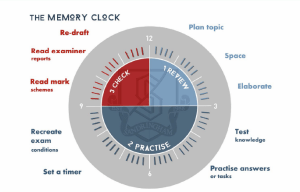Although revision is probably the last thing on anyone’s mind at the start of a course, the science suggests that taking a structured, long-term, “little and often”, approach is the way to go…
While any revision is arguably better than no revision, I’d also suggest some forms of revision are more effective than others. And if you’re looking at introducing a more-structured approach to student revision in your classroom – one that’s built-in to a course of study rather than bolted-on at the end – you might find ideas like Retrieval Practice and Spaced Study interesting and useful.
These are ideas I’ve written about in a previous post, based on the work of the Learning Scientists and the short video-explainers they’ve produced to introduce these ideas.
If you want to dig a little deeper however, the Retrieval Practice website is dedicated, as you might reasonably expect, to all things retrieval and spaced. It has a couple (or three) very-useful and easy-on-the-eye pdf booklets you might find informative. All three booklets are practical guides to implementing a Spaced Retrieval Revision system into your classroom and all three work across a wide range of subjects (not just Sociology and Psychology, although both of these subjects are particularly amenable to Spaced Retrieval):
1. How to use Retrieval Practice to Improve Learning provides a clear overview of the basic technique and suggestions for how it can be introduced and implemented. There’s also a handy Implementation Checklist included in the booklet.
2. How to use Spaced Retrieval Practice to Boost Learning introduces the concept of spaced retrieval and includes suggestions about how to implement it in the classroom. This, as you’ll discover, will probably involve rethinking and reordering of some of the ways you teach to accommodate spaced retrieval.
Alternatively, if you simply want to introduce spaced retrieval on an individual level Sandringham School’s Memory Clock offers a clear, straightforward and highly-visual, guide to implementing spaced revision.
3. Fostering Application of Knowledge is a little more ambitious and looks at how students can be encouraged to apply knowledge across various aspects of their course. While it’s definitely something worth considering, it’s probably advisable to get up-to-speed with the basic theory and mechanics of spaced learning before rushing to adopt this one.



